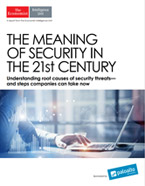 The Economist Intelligence Unit
The Economist Intelligence Unit
Overview: This research begins with the premise that corporate leaders’ efforts to manage security risks—threats to physical assets, IT infrastructure and personnel—will be more effective when informed by a clear understanding of those risks’ societal motivators.
Executives and board members recognise that sources of conflict—such as ethnic or religious differences, poverty and income inequality, hunger and resource scarcity—motivate many of the insecurity risks they face, a global survey conducted by The EIU reveals. They also acknowledge that such concerns will mostly remain beyond the scope of a corporate security programme.
The survey reveals that attempts to address these larger underlying issues might run contrary to corporate culture, demand resources a company doesn’t have or risk political pushback. Survey respondents are confident in the abilities of political authorities in relation to these matters, but believe some of the risks to businesses are not given sufficient political attention.
In the face of these challenges, corporate security leaders explain that their work in this realm mostly occurs at some more actionable middle ground between their standard security measures and the societal roots of the threats. They primarily treat the symptoms, but with the knowledge that in the long run they will need to achieve more.
Today, security-management programmes focus on protection of networks, data and intellectual property, as well as facilities and people. Enhancing cyber security lies at the heart of this effort, with physical security having, in significant ways, converged with digital protection efforts.
Interviewees identified many areas where co-operative action and a growing awareness can help to address the societal motivations that result in security threats, benefitting not only businesses but also society as a whole.
